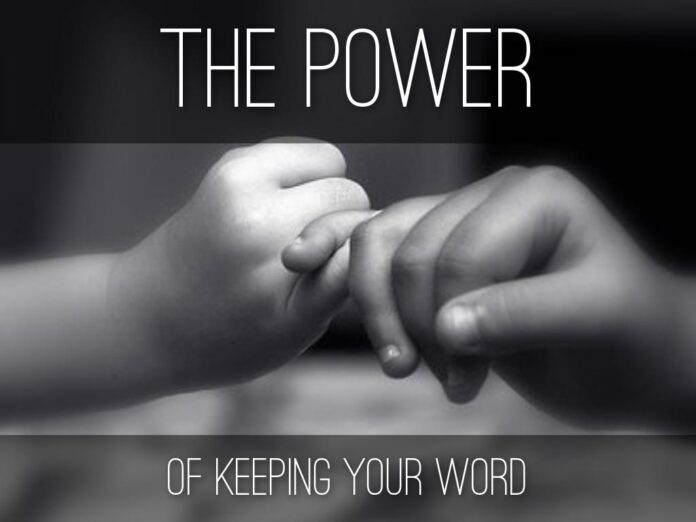Keeping your word means doing what you say you’ll do. It’s agreeing to follow through on a commitment.
Honouring your promises (no matter how small) can earn you an enviable reputation for dependability, reliability and trustworthiness. This, in turn, can help you to develop and deepen your relationships.
However, it’s sometimes very hard to do what we say we’ll do.
Why Do We Struggle to Keep Our Word?
We make promises for lots of reasons, and our intentions are usually good. For example, we want to help other people, to make them happy, or to make something happen. But sadly, our actions don’t always measure up to the promises that we make.
Some of the reasons we don’t keep our word include:
- We don’t realize that we’ve made or implied a promise.
- We forget what we’ve said.
- We get side-tracked by other events.
- We lose enthusiasm when we realize that keeping our word is harder than we expected.
- We haven’t allowed enough time, or we have a scheduling conflict.
- We lack the power to do what we’ve said we’d do.
Reasons Keeping Your Word Will Improve Your Life
When we become a person who keeps their word, we’ll create new experiences. Here are five reasons you should always keep your word.
- You will develop a higher level of self-trust. A higher level of self-trust means greater self-respect, self-worth and self-integrity.
- You will deepen your relationships with others. The relationships we have with others reflect the relationship we have with ourselves.
- You will not have to deal with regret or guilt. If we follow through on what we say we’ll do, we don’t have to worry about feeling guilt or regret.
- You will be more thoughtful about the words you use. When we’re more intentional about the words we use, there will not be misinterpretations or misunderstandings.
- You will be more selective about what you agree to do. When we have an identity of a person who keeps their word, making decisions will become easier. We’ll know what to say yes or no to.
The Impact of Broken Promises
You may get away with letting someone down once or twice. But the consequences can be deep and enduring if you go back on your promises too often, whether or not it’s intentional.
Your co-workers will lose trust in you and likely hesitate to ask you for help again, and you might find yourself excluded from discussions. Your manager may start allocating projects to more reliable people, and you could lose certain privileges.
The personal consequences of breaking your word can be very serious. Your professional standing will decline as more people lose their trust in you. You may come up with all manner of excuses for your behaviour, which can further damage your reputation. And, when you feel shame or guilt, you could start to suffer from stress or a crisis of confidence.
Are You a Promise Breaker?
Chances are, you do occasionally break a promise – you’re human, after all! But it’s worth thinking about how dependable you are as a colleague, as a friend.
So, ask yourself some serious questions, such as: “Do I sometimes agree to things, even though I know that I can’t do them, or that I don’t want to?” Or, “Have people stopped asking me for help or support?”
You might let yourself down, too. For example, how often do you cancel personal plans at the last minute? And have you ever sabotaged your own important goals?
If you recognize some of these behaviours, you’re now ready to do something about it!
Tips for Keeping Words
Most of us make promises for good reasons. We sometimes need strategies that will help us to stick to what we say.
Here are some pointers to follow:
- Be Organized
We often make promises impulsively. But, it’s wiser to stop and think before you agree to act. Check your diary for scheduling clashes. Be sure that you have the resources to complete the task. And clarify exactly what you’re committing to.
Don’t say “yes” if you’ve any doubt that you’ll be able to keep a promise. Instead, politely decline the request, or negotiate a compromise.
- Be Motivated
It’s much easier to keep a promise when you genuinely want to do so. You’re enthusiastic and you’ll not let anything get in your way.
But think carefully about your motives for agreeing to a request. Do you really want to help out, or are you saying “yes” just because it would please people? Ask questions to understand what the impact of your actions might be – is there a greater purpose that you can focus on, that will motivate you to deliver?
- Don’t Overpromise
There will always be occasions when you know that you can’t deliver, so just be honest about it.
It can be painful to turn down requests for help, or to admit that you don’t have the capacity or the ability to do something. But, it’s far better to do so than to risk giving people false hope, or to be untruthful.
- Be Principled
People sometimes excuse their promise-breaking by claiming something like, “Well, that’s business!” Or, “It’s OK, Miles won’t mind me missing his speech. He knows I’m always busy!”
Avoid falling back on “get-out clauses” like these. They put your honesty, dependability and reputation on the line. Instead, be guided by your values and principles, and strive for high standards of behaviour.
- Be Sincere
Sometimes, events outside our control block all of our efforts to honour our word, however hard we try. Illness, family emergencies, and equipment malfunctions are forgivable. Even so, it’s important to recognize that you have let someone down, so acknowledge this and apologize if appropriate. People will appreciate it and be understanding, and you’ll preserve your reputation.




































